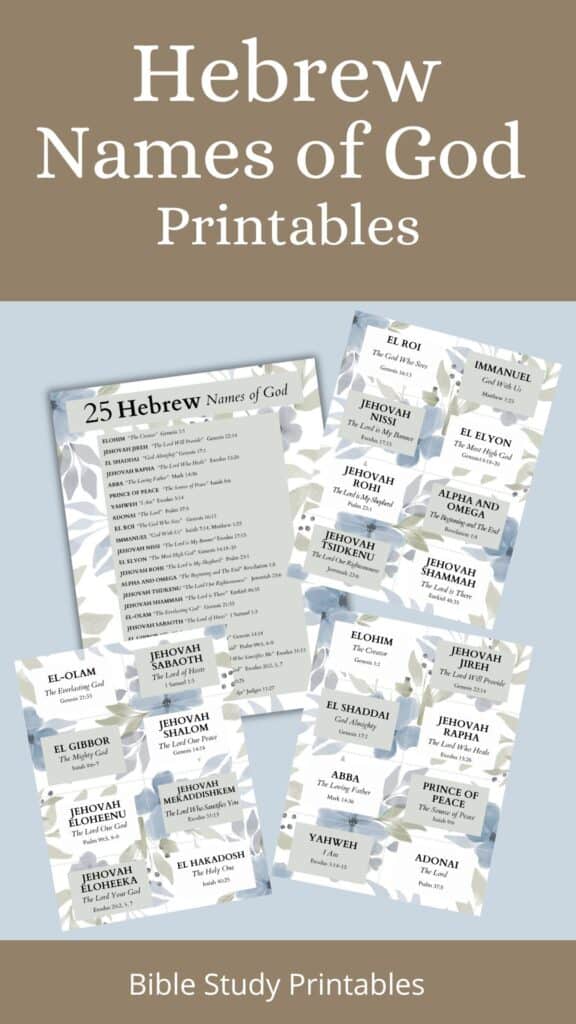Have you studied the Hebrew names of God?
God’s name comes in many forms, each one designed to help us better understand His many characteristics and attributes.
Understanding the Hebrew names of God can aid in the interpretation of biblical passages.
It can provide deeper insights into the relationships between God and individuals in the Bible and the overarching themes of God’s faithfulness, provision, and guidance.
Understanding the Hebrew names of God allows us to apply these attributes to our everyday lives.
We can draw strength from them when facing challenges or find comfort in them knowing that God is attentive to our circumstances.
These names become sources of guidance and reassurance as we navigate the difficult times in our lives.
This post may contain affiliate links, please see our full disclosure for more information.
Printable Names of God
The Bible, both the Old Testament and New Testament, contains various Hebrew names of God. Learning these names provides Christians with a deeper understanding of the biblical text.
Many passages in the Bible use these names to convey specific aspects of the character of God and His loving nature.
Each Hebrew name of God emphasizes specific characteristics and attributes of God.
Below, you will find 25 names of God – directly from the word of God – along with a printable cards for each one.
Use these cards for memorization of the different names during your Bible study time.
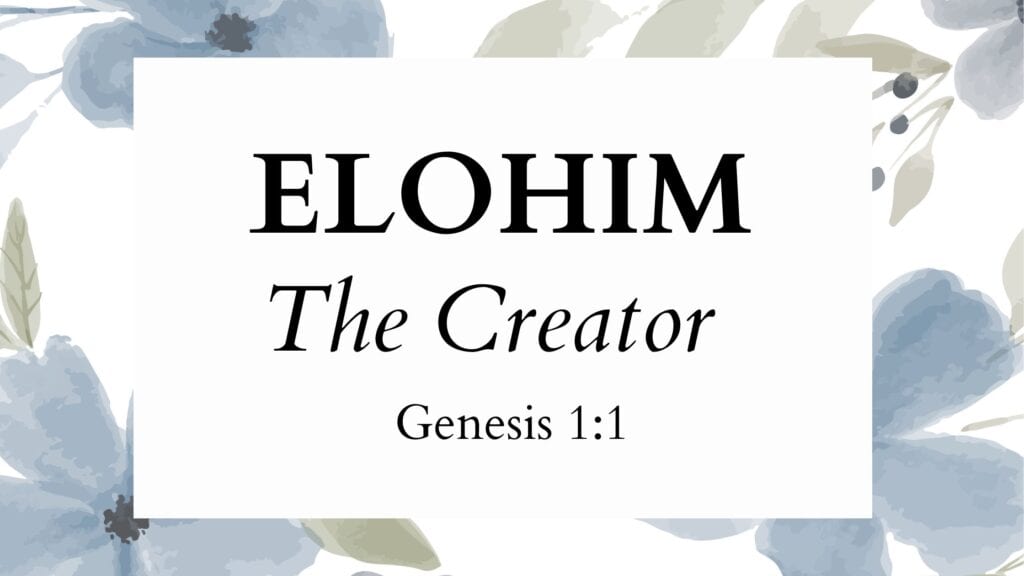
ELOHIM The Creator
In the beginning God created the heavens and the earth. Genesis 1:1
“Elohim” is introduced in the opening verse of the Bible, but its significance extends throughout the entire Old Testament and even into the New Testament.
It continues to be used to describe God’s creative power and authority, reinforcing the foundational concept of God’s sovereignty and role as the sustainer of all life.
This name is a reminder to believers of God’s enduring nature as the Creator and the one who governs the world with wisdom and purpose.
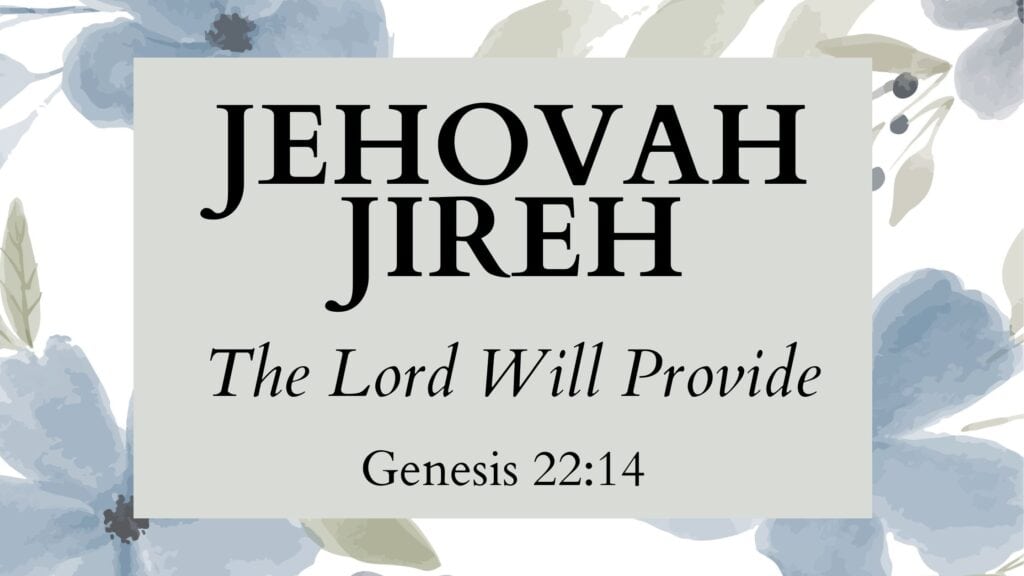
JEHOVAH JIREH The Lord Will Provide
So Abraham called that place The Lord Will Provide. And to this day it is said, “On the mountain of the Lord it will be provided.” Genesis 22:14
“Jehovah Jireh” encapsulates the concept of God’s unwavering faithfulness and provision in the lives of His people.
In Abraham’s story, it was a ram that God provided as a substitute for Isaac’s sacrifice.
This act demonstrated God’s faithfulness to His covenant promises with Abraham and revealed His compassionate nature.
It serves as a powerful reminder that God is not only aware of our needs but is also committed to meeting them.
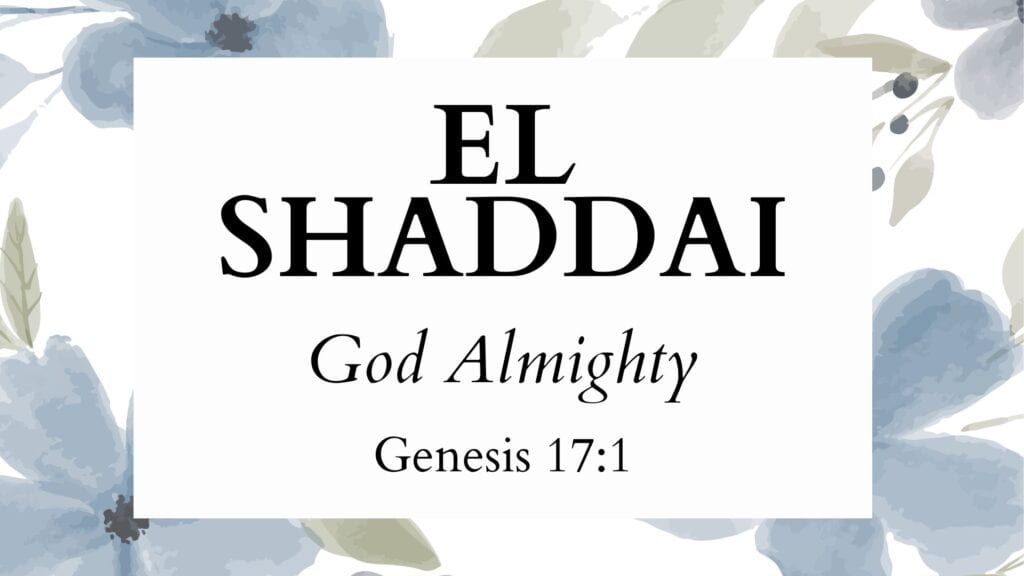
EL SHADDAI God Almighty
When Abram was ninety-nine years old, the Lord appeared to him and said, “I am God Almighty[a]; walk before me faithfully and be blameless. Genesis 17:1
Throughout the Old Testament, “El Shaddai” is a source of comfort and reassurance for God’s people.
It signifies His ability to provide, protect, and nurture them through every challenge and trial. It reminds us of God’s sufficiency in our lives, encouraging us to place our trust in His all-powerful and nurturing care.
It serves as a reminder that God is not only the Almighty One but also the One who sustains, nourishes, and provides for His people, offering a deep sense of security and confidence in our spiritual growth journey.
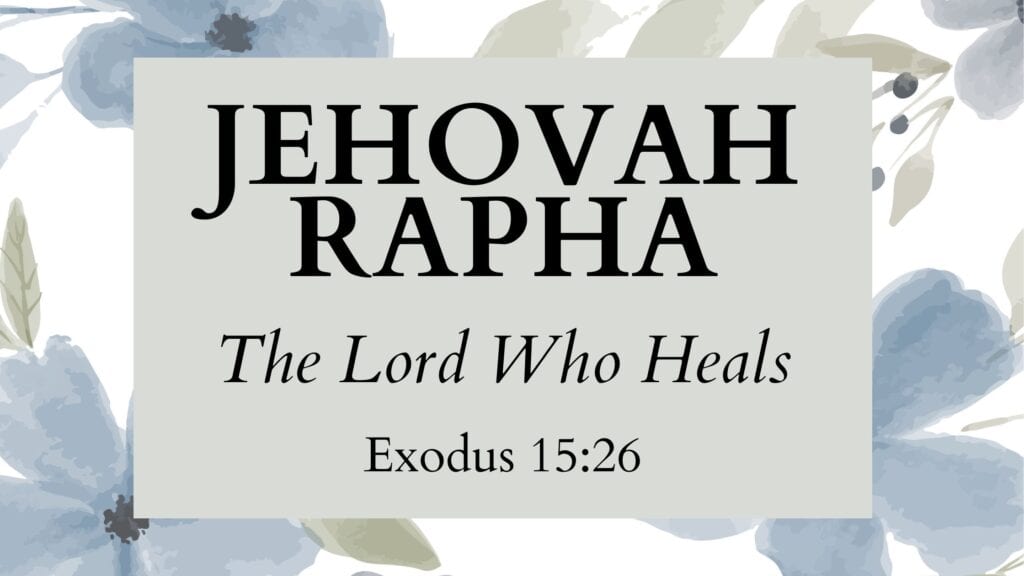
JEHOVAH RAPHA The Lord Who Heals
He said, “If you listen carefully to the Lord your God and do what is right in his eyes, if you pay attention to his commands and keep all his decrees, I will not bring on you any of the diseases I brought on the Egyptians, for I am the Lord, who heals you.” Exodus 15:26
The name “Jehovah Rapha” reminds us of God’s compassion and willingness to restore His people.
It points to God’s heart for those who are suffering and in need of healing.
Throughout the Bible, there are numerous accounts of God’s compassion in healing the sick, comforting the brokenhearted, and renewing the spirits of the downtrodden.
This name signifies the compassionate aspect of God’s character, inviting us to seek His healing touch with confidence and trust.
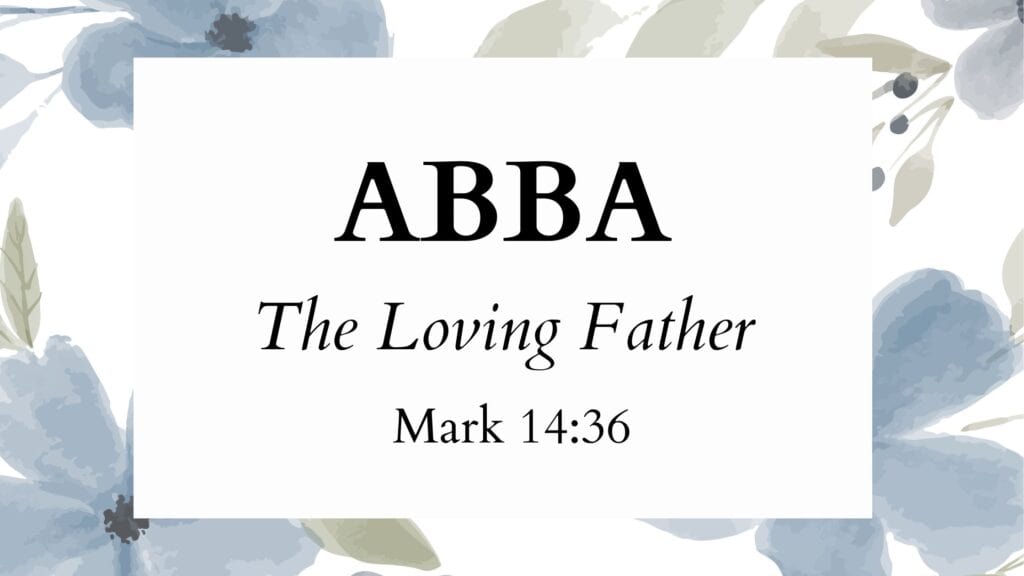
ABBA Loving Father
“Abba, Father,” he said, “everything is possible for you. Take this cup from me. Yet not what I will, but what you will.” Mark 14:36
“Abba” is a term of deep intimacy and relational depth. It’s akin to a child calling out to their loving father, conveying a sense of closeness, trust, and vulnerability.
When Jesus used this term to address God, it demonstrated a unique and intimate connection that He had as the Son of God.
This usage invites all of us to approach God with a similar sense of closeness and trust, knowing that we are beloved children in God’s family.
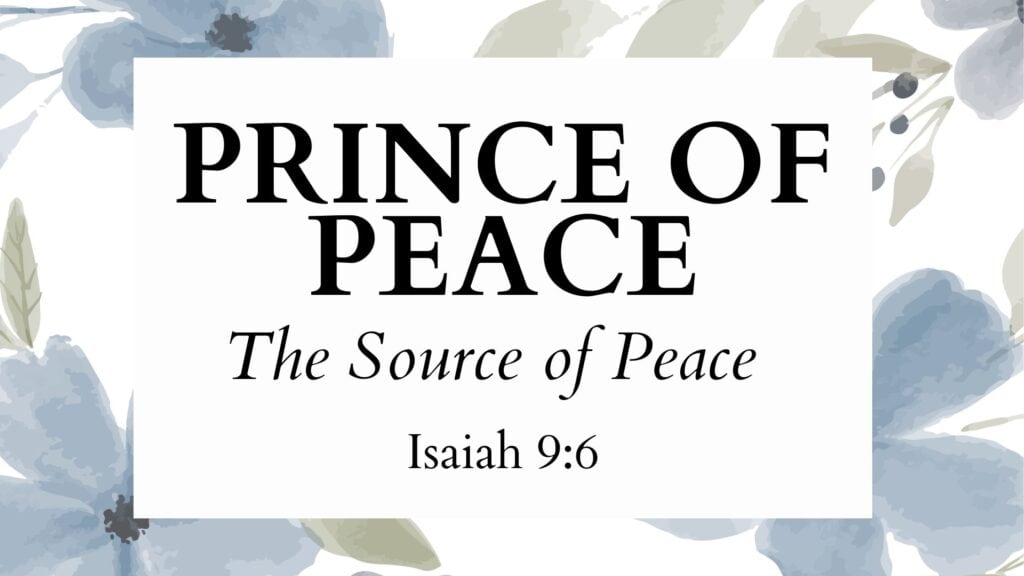
PRINCE OF PEACE The Source of Peace
For to us a child is born, to us a son is given, and the government will be on his shoulders. And he will be called Wonderful Counselor, Mighty God, Everlasting Father, Prince of Peace. Isaiah 9:6
The title “Prince of Peace” signifies the promise of a universal and lasting peace brought by the Messiah.
It signifies the promise of restoration of the relationship with God, inner tranquility, peacemaking, and hope for a world in need of reconciliation.
Embracing this name invites us to not only experience God’s peace but also to be ambassadors of peace, reflecting the character and mission of the Messiah, Jesus Christ, in a world yearning for true and lasting peace.
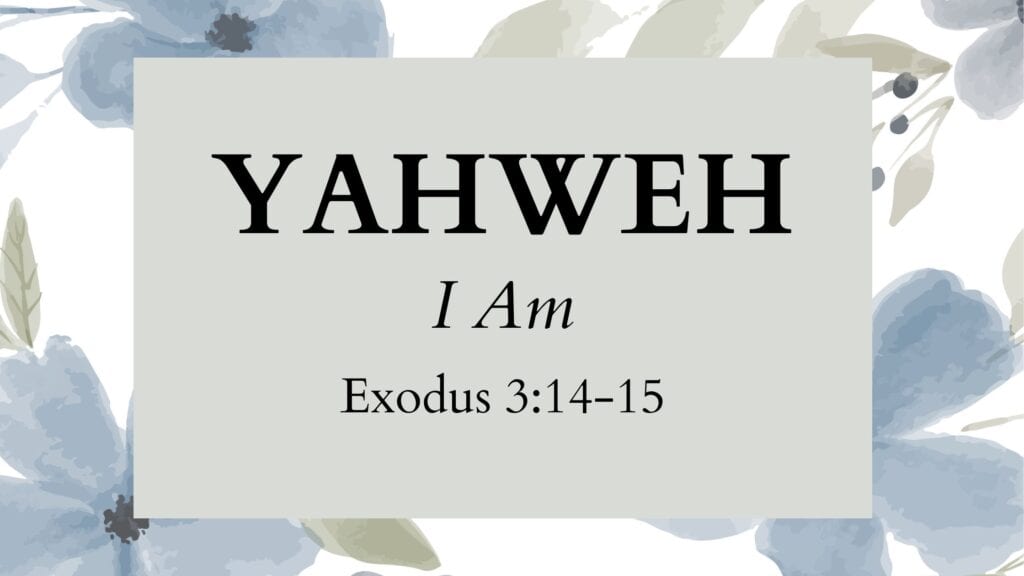
YAHWEH I Am
God said to Moses, “I am who I am. This is what you are to say to the Israelites: ‘I am has sent me to you.’” Exodus 3:14
The name “Yahweh” contains the idea of God’s self-existence and eternality.
When God identifies Himself as “I AM WHO I AM”, He reveals that He is the One who exists independently and has no beginning or end.
This aspect of the name signifies God’s unchanging and timeless nature.
For us, it emphasizes the reliability and constancy of God. He is the same yesterday, today, and forever, and His promises are sure.
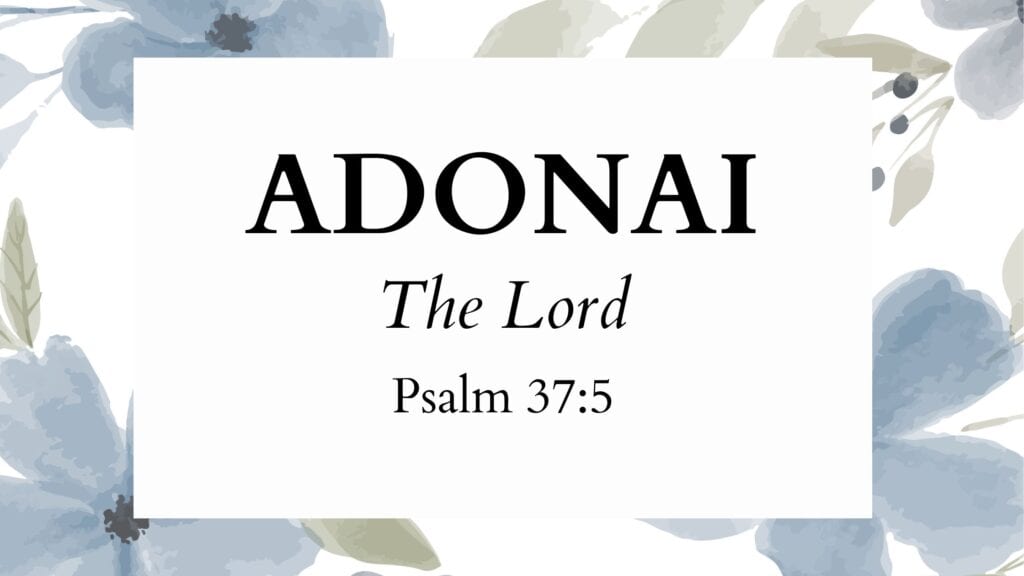
ADONAI The Lord
Commit your way to the Lord; trust in him and he will do this: Psalm 37:5
The title “Adonai” conveys the idea of God’s lordship and supreme authority. It signifies God’s position as the ultimate Master and Ruler of the universe.
In the Hebrew Bible, this title is frequently used to emphasize God’s role as the one who leads, provides for, and protects His people, especially in times of need.
It underscores the notion that God is not merely a distant deity but an active and benevolent Lord who cares for His creation.
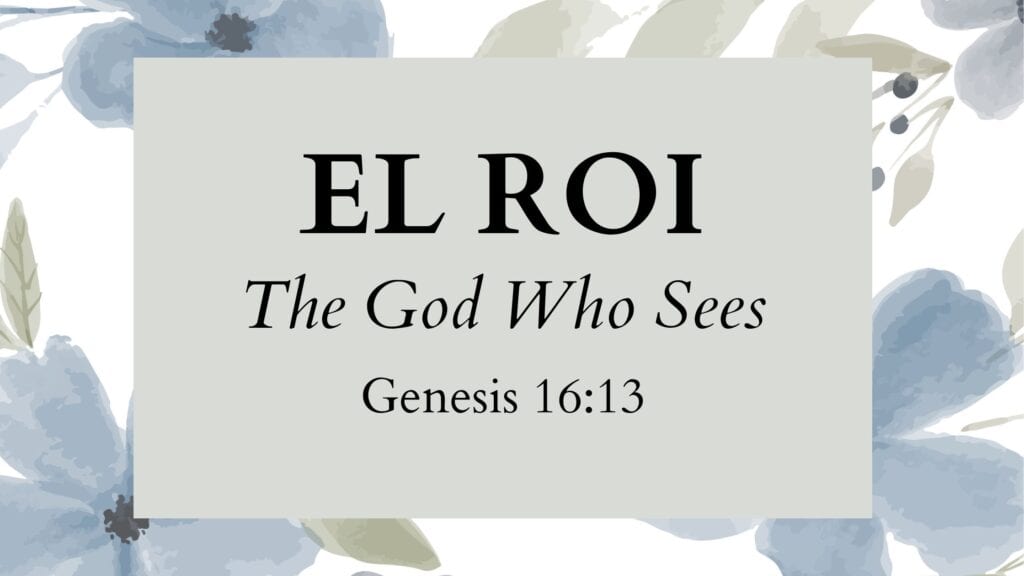
EL ROI The God Who Sees
She gave this name to the Lord who spoke to her: “You are the God who sees me,” for she said, “I have now seen the One who sees me.” Genesis 16:13
The first appearance of “El Roi” in the Bible occurs in the context of Hagar, who found herself in a desperate situation.
She had fled from her mistress Sarah’s harsh treatment and was alone in the wilderness. In her moment of despair, God appeared to her and revealed Himself as “El Roi.”
This illustrates that God is especially near to those who feel lost or abandoned, and He extends His compassion to them. It shows that even in the wilderness of life, God’s presence can be experienced.

IMMANUEL God With Us
Therefore the Lord himself will give you a sign: The virgin will conceive and give birth to a son, and will call him Immanuel. Isaiah 7:14
The virgin will conceive and give birth to a son, and they will call him Immanuel” (which means “God with us”). Matthew 1:23
“Immanuel” is a name of God that represents the promise and reality of divine presence among humanity.
It signifies the fulfillment of this promise through the birth of Jesus Christ and is the foundation of the Christian faith.
“Immanuel” invites believers into a deep, personal relationship with God, offering comfort, hope, and the assurance that God is with them in every aspect of their lives.
It encapsulates the profound truth that, through Jesus Christ, “God is with us” in the most intimate and transformative way imaginable.
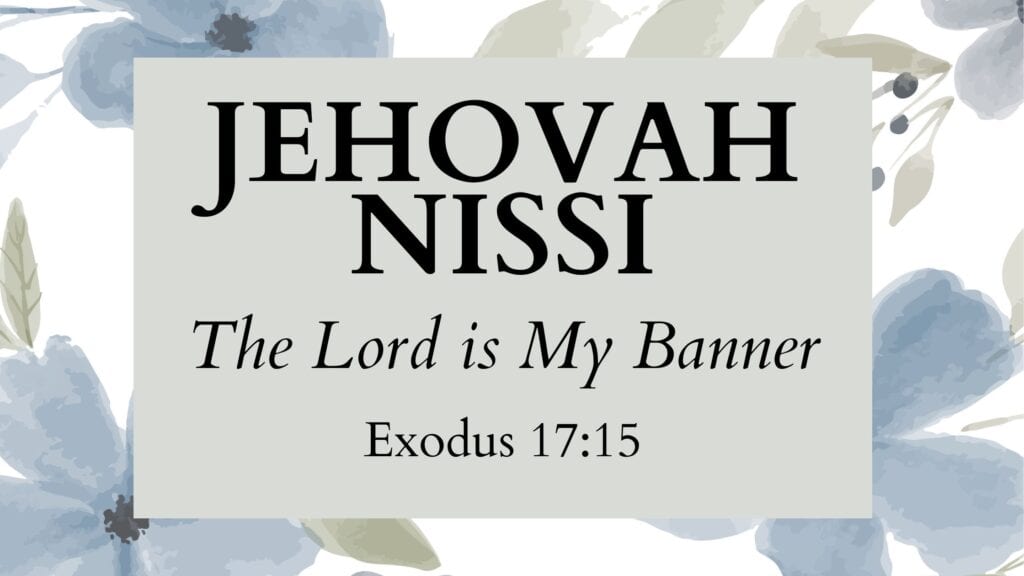
JEHOVAH NISSI The Lord is My Banner
Moses built an altar and called it The Lord is my Banner. Exodus 17:15
The name “Jehovah Nissi” signifies that victory in battles and challenges ultimately comes from God.
In the context of the Israelites’ battle against the Amalekites, it was not their military might but the divine intervention of God that secured their victory.
This name serves as a reminder to us that when they face adversities, whether physical or spiritual, we can rely on God’s power and providence.
It encourages us to trust in God as the ultimate source of triumph in life’s struggles.
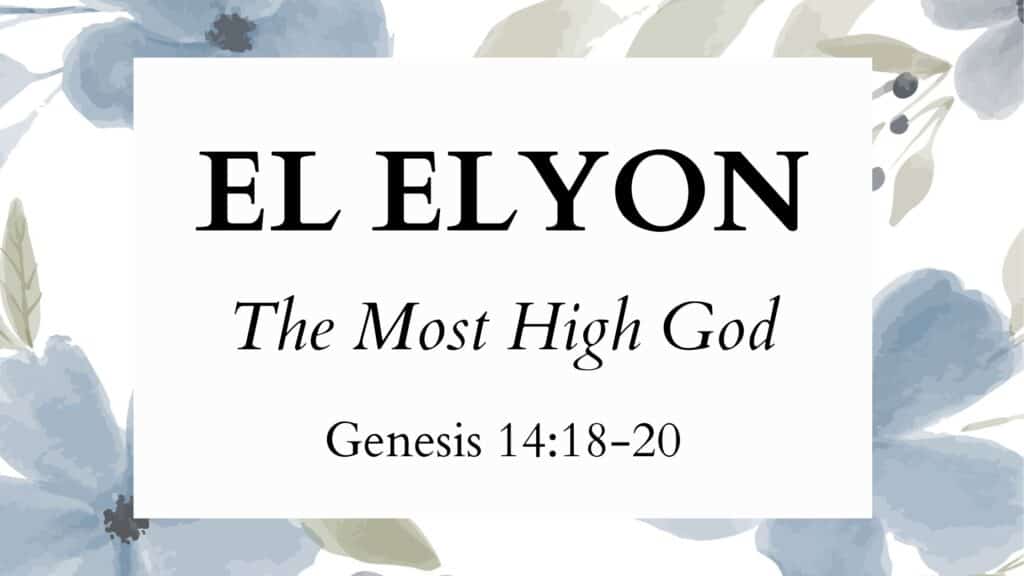
EL ELYON The Most High God
Then Melchizedek king of Salem brought out bread and wine. He was priest of God Most High, 19 and he blessed Abram, saying, “Blessed be Abram by God Most High, Creator of heaven and earth. 20 And praise be to God Most High, who delivered your enemies into your hand.” Then Abram gave him a tenth of everything. Genesis 14:18-20
Acknowledging God as “El Elyon” fosters humility and trust.
It reminds them of their proper place in relation to God—humans are finite and dependent on the Most High God.
This recognition encourages humility before God’s greatness and trust in His wisdom and providence.
We can find comfort in surrendering to God’s supreme authority, knowing that His plans and purposes are beyond human understanding.
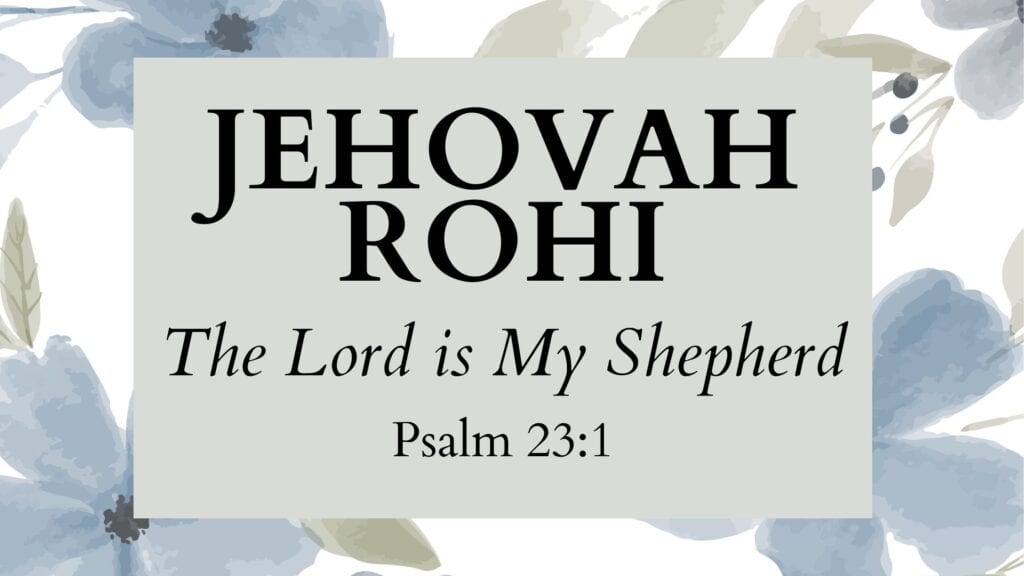
JEHOVAH ROHI The Lord is My Shepherd
The Lord is my shepherd, I lack nothing. Psalm 23:1
“Jehovah Rohi” portrays God as a loving and caring shepherd who leads, guides, and watches over His flock.
This imagery reflects the idea that God takes a personal interest in the lives of His people.
Just as a good shepherd knows each of his sheep by name, God knows and cares for each individual believer.
This name signifies that God provides direction, wisdom, and protection throughout the journey of life.
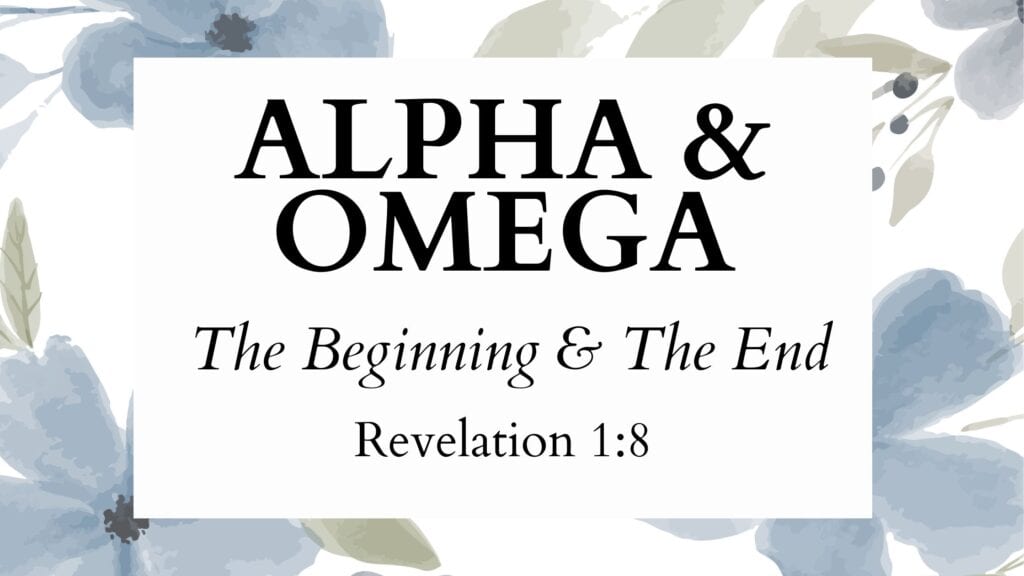
ALPHA AND OMEGA The Beginning and The End
“I am the Alpha and the Omega,” says the Lord God, “who is, and who was, and who is to come, the Almighty.” Revelation 1:8
“Alpha and Omega” emphasizes the eternal existence and divine nature of Jesus Christ.
The use of these Greek letters signifies that He is the beginning and end of all things, and that His existence extends beyond the confines of time and space.
In times of uncertainty, trial, or grief, the recognition of Jesus as the “Alpha and Omega” provides comfort and hope.
We can trust that the same eternal and sovereign God who created all things is also the one who holds our future and offers us the gift of everlasting life.
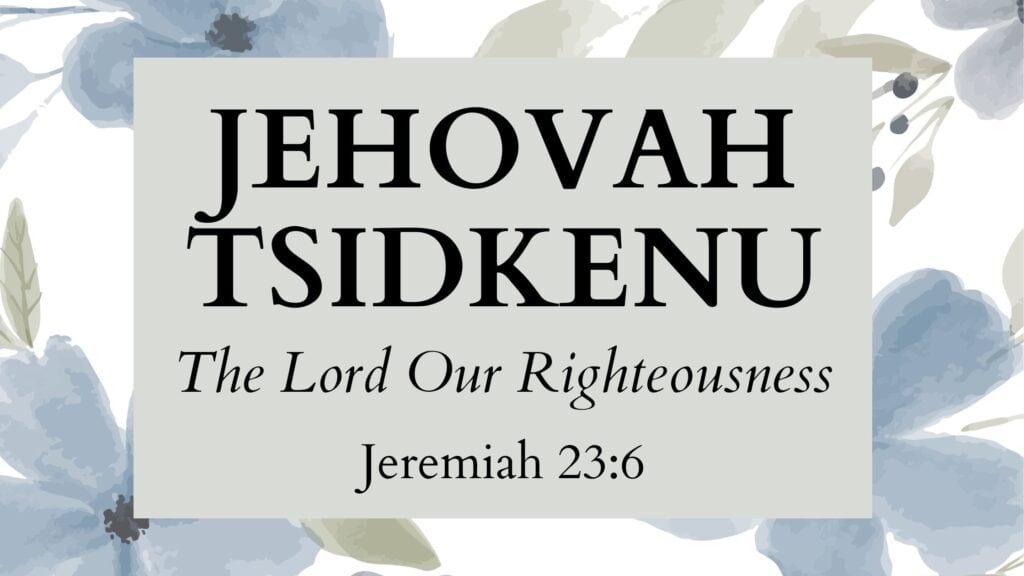
JEHOVAH TSIDKENU The Lord Our Righteousness
In his days Judah will be saved and Israel will live in safety. This is the name by which he will be called: The Lord Our Righteous Savior. Jeremiah 23:6
“Jehovah Tsidkenu” signifies that human righteousness is inadequate for a relationship with a holy God.
We understand that our righteousness falls short of God’s standards. Therefore, we rely on God’s righteousness, imputed to us through faith in Jesus Christ.
This imputed righteousness is a gift from God, making us right with Him despite ourown moral failings.
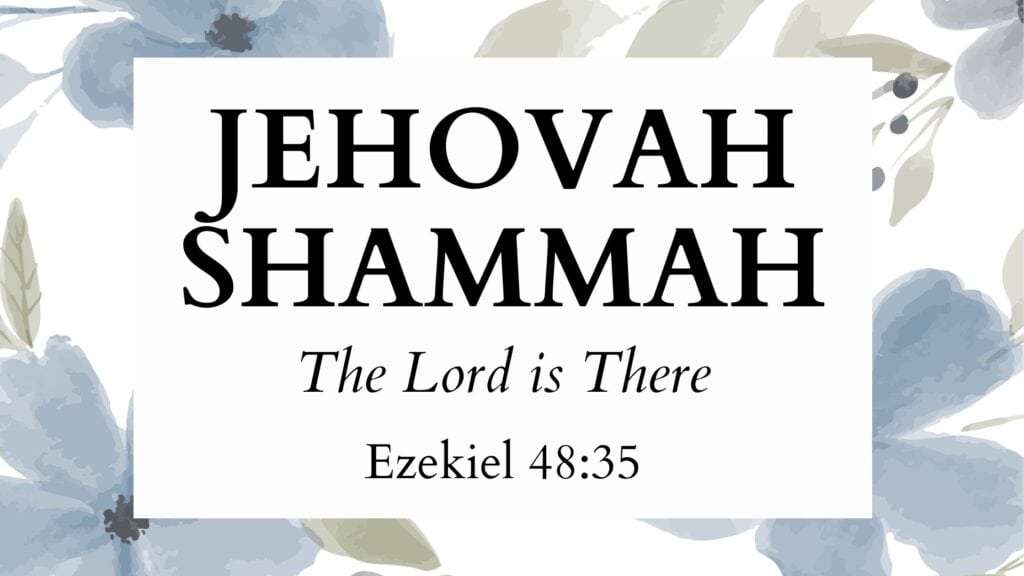
JEHOVAH SHAMMAH The Lord is There
“The distance all around will be 18,000 cubits. “And the name of the city from that time on will be: the Lord is there.” Ezekiel 48:35
“Jehovah Shammah” signifies God’s omnipresence, assurance of His presence, a source of strength and courage, an invitation to worship and commune with Him, and the promise of restoration.
This name encourages us to be mindful of God’s constant presence in our lives, to seek Him in every circumstance, and to find comfort and hope in His abiding presence.
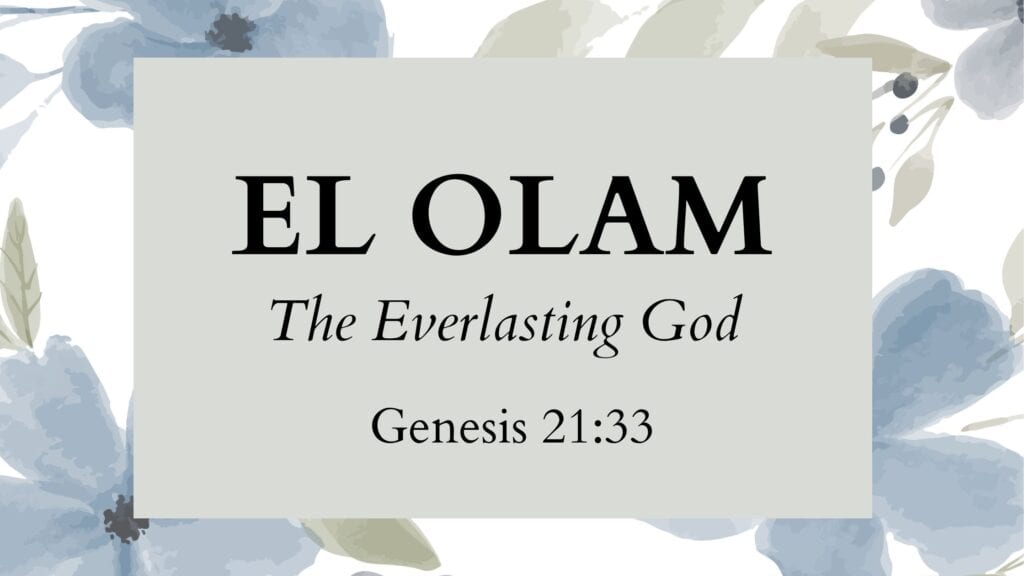
EL OLAM The Everlasting God
Abraham planted a tamarisk tree in Beersheba, and there he called on the name of the Lord, the Eternal God. Genesis 21:33
“El Olam” signifies God’s eternal nature, unchanging character, a source of comfort, a call to adopt an eternal perspective, and an invitation to worship and reverence.
This name reminds us that God transcends time and is the source of stability and hope in a world marked by transience and change.
It encourages a deep sense of awe and trust in the Everlasting God who has no beginning or end.
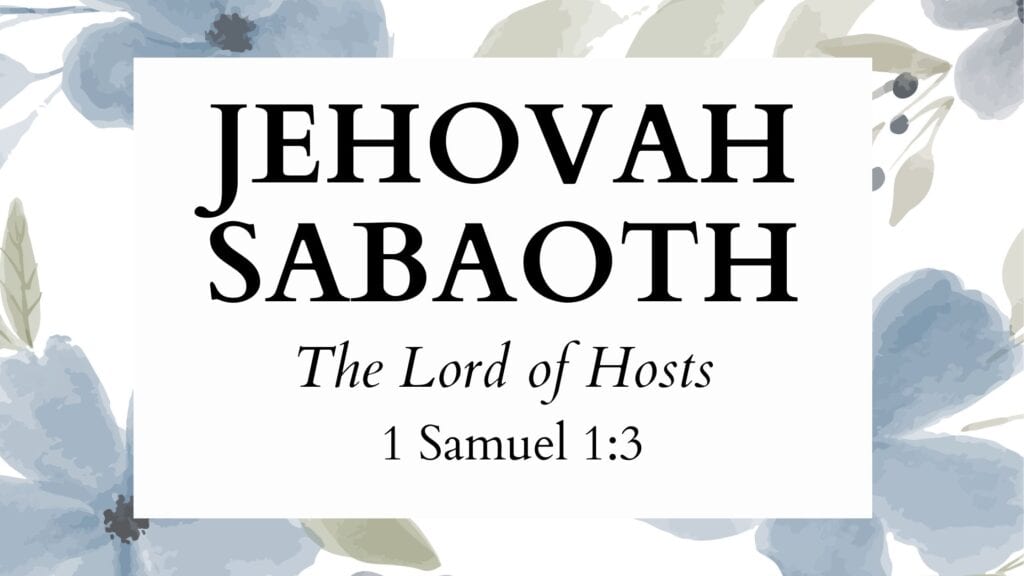
JEHOVAH SABAOTH The Lord of Hosts
Year after year this man went up from his town to worship and sacrifice to the Lord Almighty at Shiloh, where Hophni and Phinehas, the two sons of Eli, were priests of the Lord. 1 Samuel 1:3
The title “The Lord of Hosts” conveys the idea of God as a protector and deliverer.
In times of trouble, crisis, or spiritual battles, we can find comfort in the knowledge that God’s heavenly armies are fighting on our behalf.
This name assures us that God is our stronghold and refuge, capable of defending us against our enemies, whether physical or spiritual.
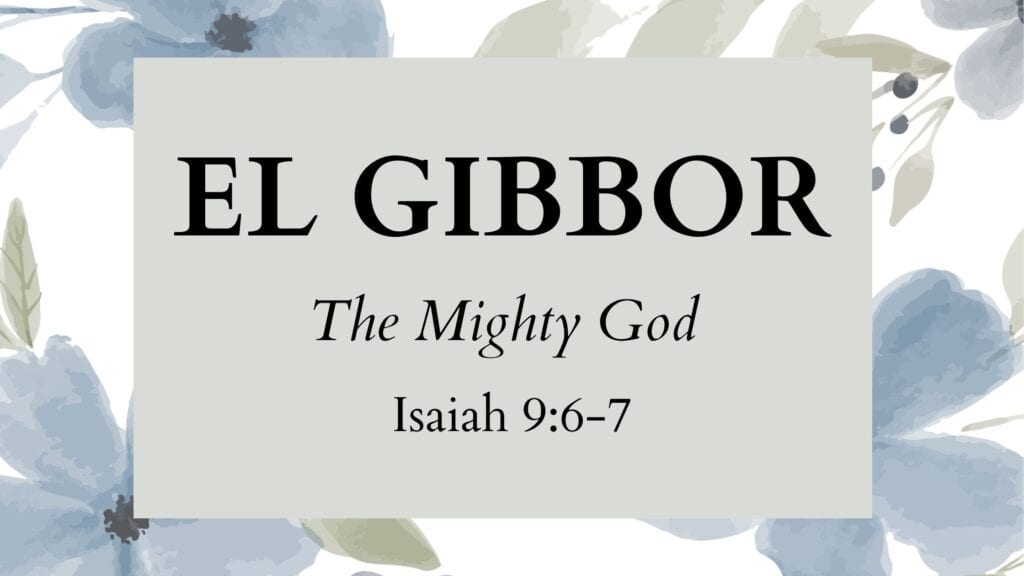
EL GIBBOR The Mighty God
For to us a child is born, to us a son is given, and the government will be on his shoulders. And he will be called Wonderful Counselor, Mighty God, Everlasting Father, Prince of Peace. Isaiah 9:6-7
El Gibbor” signifies His omnipotence, strength, sovereignty, and reliability.
This name reminds us of God’s limitless power and authority and encourages us to place our faith and trust in the Almighty God who provides protection, deliverance, and unwavering support.
It inspires a deep sense of reverence, reliance, and confidence in His character.

JEHOVAH SHALOM The Lord Our Peace
Then Melchizedek king of Salem brought out bread and wine. He was priest of God Most High, Genesis 14:18
“Jehovah Shalom” emphasizes God as the ultimate source of peace.
In a world marked by conflict, turmoil, and anxiety, this name signifies that true peace can only be found in a relationship with God.
God desires harmony and reconciliation. It reflects His nature as a God of order and unity.
We are called to seek and promote peace in our lives and relationships, following God’s example of reconciliation and forgiveness.

JEHOVAH ELOHEENU The Lord Our God
Exalt the Lord our God and worship at his footstool; he is holy. Psalm 99:5
Lord our God, you answered them; you were to Israel a forgiving God, though you punished their misdeeds. Exalt the Lord our God and worship at his holy mountain, for the Lord our God is holy. Psalm 99:8-9
“Jehovah Eloheenu” signifies a deep and personal relationship with God.
It is a reminder that we are not alone but have a loving and caring God who is with us in all circumstances.
This name evokes a sense of belonging, comfort, and assurance, as we acknowledge God as our Shepherd and Provider.
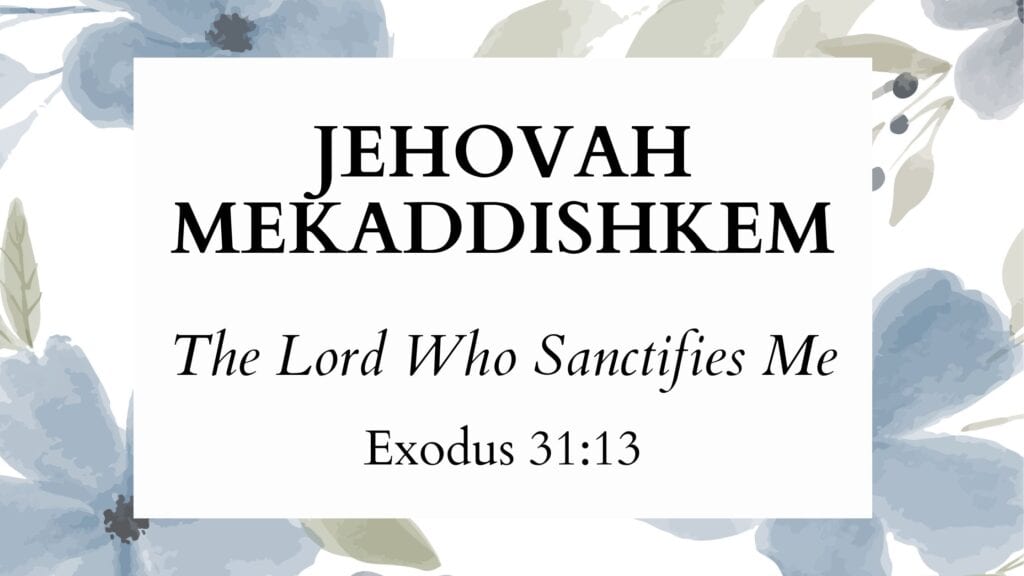
JEHOVAH MEKADDISHKEM The Lord Who Sanctifies Me
“Say to the Israelites, ‘You must observe my Sabbaths. This will be a sign between me and you for the generations to come, so you may know that I am the Lord, who makes you holy. Exodus 31:13
The title “The Lord who sanctifies you” signifies God’s role in the process of sanctification.
Sanctification is the ongoing process by which we are conformed to the image of Christ and made holy.
It involves the cleansing of sin, the development of godly character, and the empowerment to live in obedience to God’s commands.
This name encourages us to yield to God’s work of sanctification in our lives and to cooperate with His transformative power.
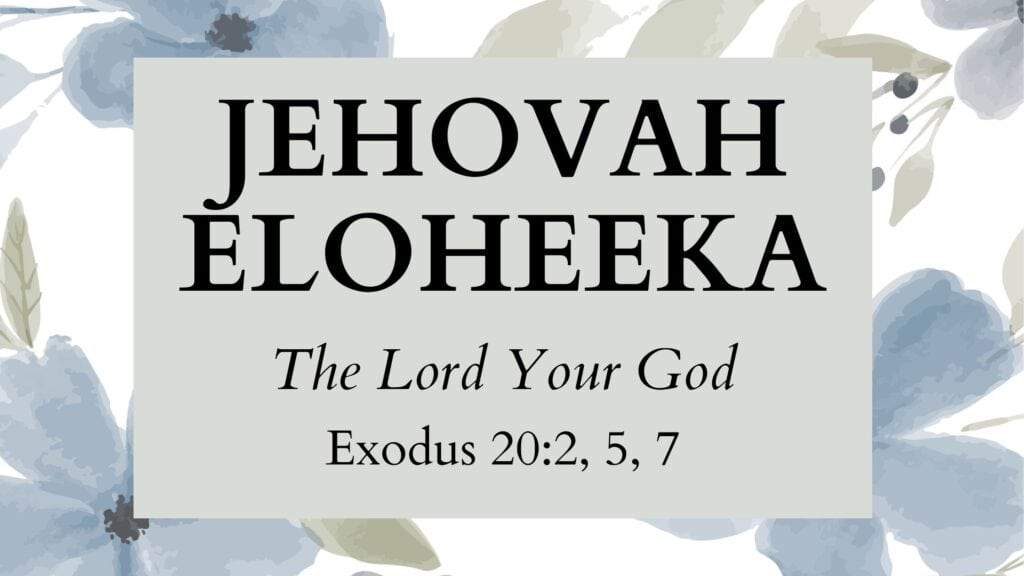
JEHOVAH ELOHEEKA The Lord Your God
“I am the Lord your God, who brought you out of Egypt, out of the land of slavery. Exodus 20:2
You shall not bow down to them or worship them; for I, the Lord your God, am a jealous God, punishing the children for the sin of the parents to the third and fourth generation of those who hate me, Exodus 20:5
“You shall not misuse the name of the Lord your God, for the Lord will not hold anyone guiltless who misuses his name. Exodus 20:7
Recognizing God as “The Lord your God” encourages trust and dependence on Him.
We are called to place our confidence in God’s character and to rely on Him for everything.
This name invites us to entrust our lives into the hands of the loving and caring God who is deeply concerned for our well-being.
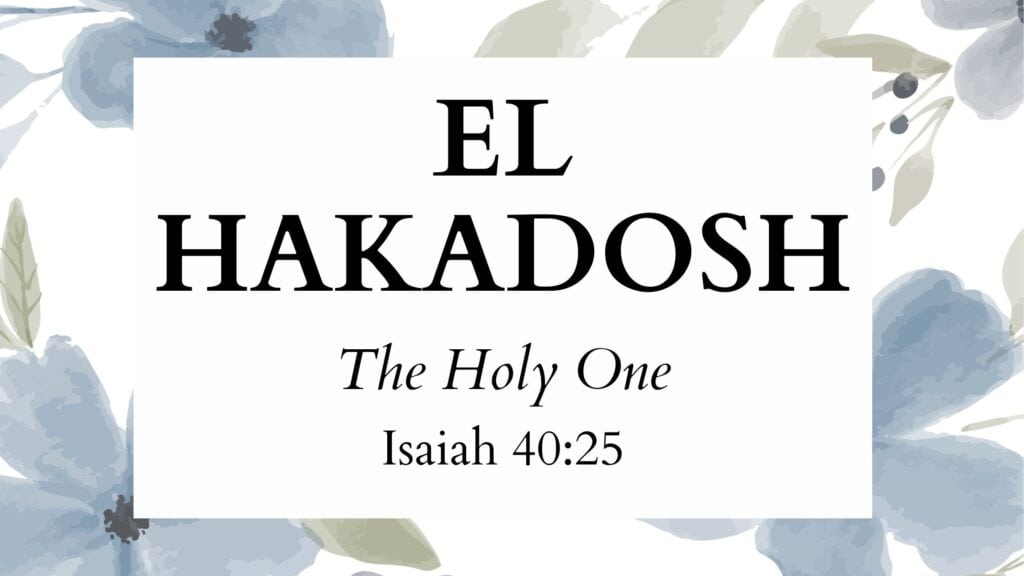
EL HAKADOSH The Holy One
“To whom will you compare me? Or who is my equal?” says the Holy One. Isaiah 40:25
“El Hakadosh” stands as a powerful declaration of God’s holiness. Holiness is an essential attribute of God in Judeo-Christian theology, signifying His moral purity and absolute righteousness.
This name underscores that God is entirely separate from sin, evil, and moral imperfection. His holiness is the standard by which all moral values and ethics are measured.
We are called to reflect this holiness in our lives and conduct, striving for purity and righteousness.
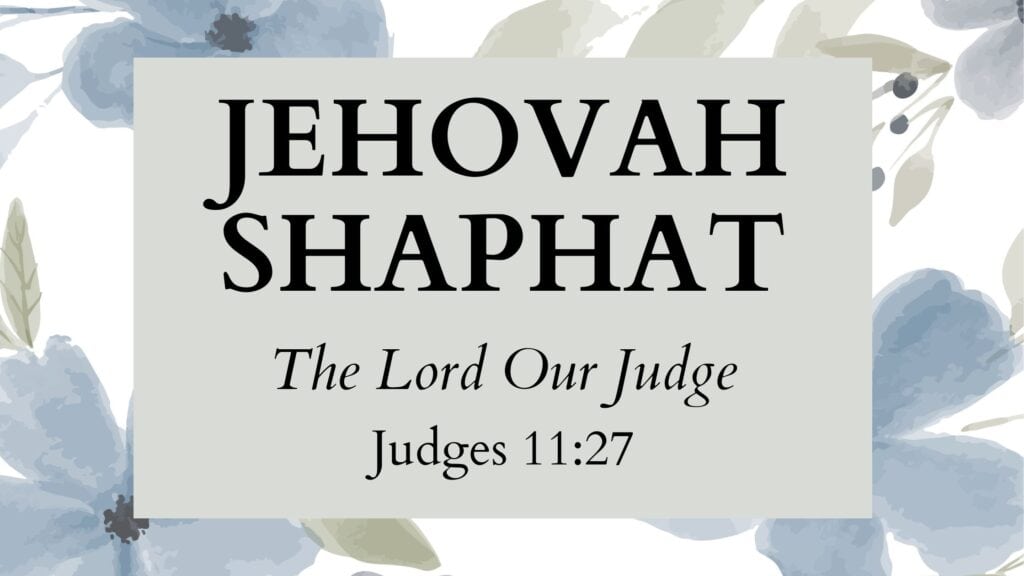
JEHOVAH SHAPHAT The Lord Our Judge
I have not wronged you, but you are doing me wrong by waging war against me. Let the Lord, the Judge, decide the dispute this day between the Israelites and the Ammonites.” Judges 11:27
The title “The Lord is Judge” emphasizes God’s sovereign authority over all matters of judgment.
It signifies that God’s judgments are not subject to human review or appeal. We are called to recognize God’s supreme authority in all aspects of life and to trust in His righteous judgments.
This recognition fosters a sense of humility and submission before the divine Judge.
Below, you can download all of these printable Names of God cards to use during your Bible study time.

God has a lot of names, doesn’t He?
I pray these names of God printables help you grow closer to our Lord Jesus Christ as you dive deeper into truly understanding His many qualities.
Memorizing these names offer a beautiful way to simply draw closer to Him.
Print them out and use them as a Bible reference as you study each name.
Feel free to download this single-page names of God printable to keep handy as a reference during your study time.
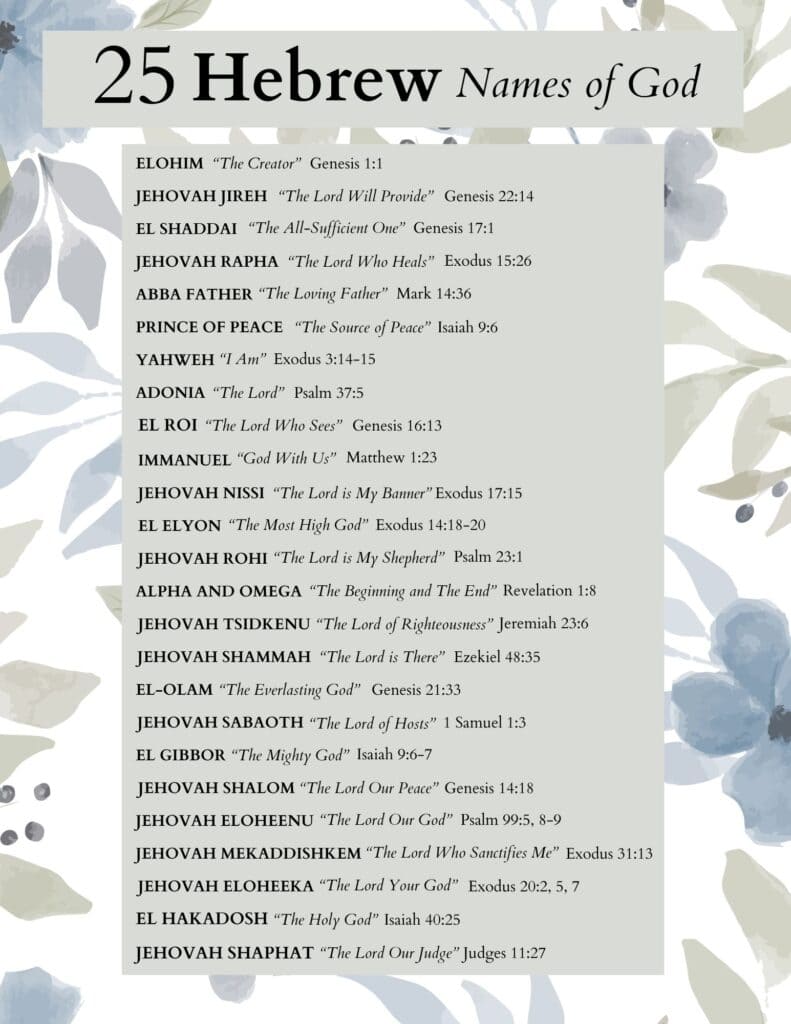
Dear Heavenly Father, As I come before You in prayer today, I am in awe of the many names by which You are known. You are Yahweh, the eternal and unchanging One, the King of Kings.
Your names reveal Your multifaceted character and the depths of Your love and care for us.
O Lord, I thank You for the privilege of knowing You by these names. Help me to continually seek a deeper understanding of who You are through the study of Your names in Scripture.
May each name be a reminder of Your faithfulness, Your provision, Your grace, and Your unending love.
I pray that as I meditate on Your names, I may grow in my faith and draw nearer to You.
May Your names be a source of strength and comfort in times of need, a wellspring of wisdom and guidance in my daily life, and a cause for praise and worship in moments of joy and gratitude.
Thank You for being a God who reveals Himself to us through Your names. May I never cease to marvel at the richness of Your character and the depth of Your love. In Jesus’ name, I pray. Amen.
For more Bible Study resources, be sure to check out:
